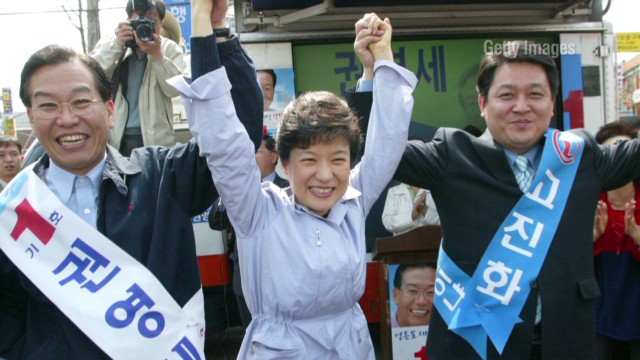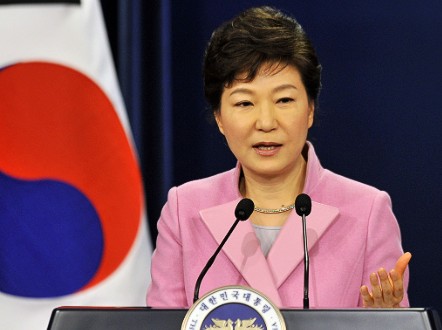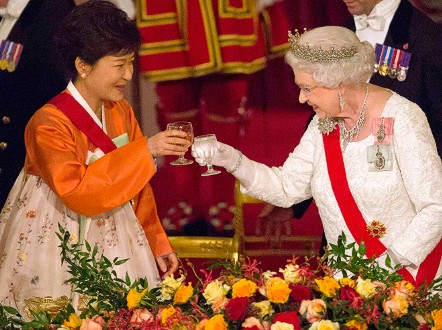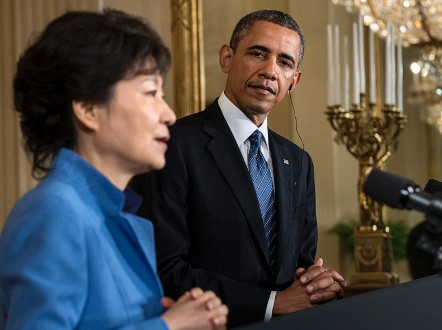
Answer: Park Geun-hye,
South Korea's first female president, and a woman who has experienced
her fair share of violence while working -- and growing up -- in
government.
Park was left with an 11 centimeter wound across her cheek after she was attacked by a man at a political rally in 2006.
Her apparently businesslike response after waking from surgery -- "How
is Daejeon?" -- referring to the party's campaign in that city, earned
her the nickname "Queen of Elections."
The moniker finally held
true in December 2012, when Park was elected president of a country
which hasn't had a female ruler for around 500 years -- not since Queen Jinseong in the 9th century.
South Korea's first female president has had her fair share of heartache.
I can say my greatest mentor is the citizens of this country
Park Geun-hye
This is a place with one of the highest levels of gender inequality in the world -- rated 111 worst out of 135 nations, by the World Economic Forum.
Indeed, if you're a working woman, South Korea is the worst developed country on the planet to live in, according to the Economist's Glass-ceiling Index.
All of which makes Park's
position particularly remarkable. But then, perhaps it's no surprise
the 62-year-old should pursue the country's top job, given her
upbringing.
Her father was military
hardman Park Chung-hee, president of South Korea from 1961 to his death
in 1979 -- when his own intelligence chief shot him over dinner.
The murder came five
years after his wife, and Park Geun-hye's mother, was also killed by an
assassin who had been targeting her husband.
And so at the age of 22,
Park Geun-hye was forced to take on the role of first lady,
accompanying her father to official events and even welcoming U.S.
President Jimmy Carter and wife Rosalynn to the country in 1979.
A toast to leading ladies: Park Geun-Hye and Britain's Queen Elizabeth.
Getty Images
Almost two decades
later, Park, who holds a degree electronic engineering, entered politics
of her own accord, and is known for her straight-talking style.
She is said to be an intensely private woman who has never married and mostly dines alone. The nation is her family, she likes to say.
With the sudden passing of my mother, heavy responsibilities and duties of the first lady were suddenly forced upon me
Park Geun-hye
With North Korea on her doorstep -- a country which the U.N. recently denounced for human rights abuses "comparable to Nazi-era atrocities" -- there is now even greater international focus on Park's leadership.
She spoke to CNN's Leading Women
about her vision for the fourth-largest economy in Asia, and the
personal tragedies which forced her into the public spotlight from an
early age.
"I believe the very fact that I was elected as the first female president of the Republic of Korea
is testament to the dynamism of Korean society. I feel an even greater
sense of responsibility as president. I also feel that we can look
forward to greater opportunities that enable women to fully tap into
their potential and live out their dreams, given the dynamism of our
society and the way the entire world is headed."
"This is a time when we see fathers, especially young fathers, who would be more than willing to play their part in raising children
and who are so willing to help their wives. We see many young fathers
who would find great reward, pleasure, and joy in raising their
children."
A few months after being elected, Park visited the U.S. to mark 60 years of bilateral partnership.
"I can say my greatest mentor is the citizens of this country."
"When I was a child I longed to become a teacher
and after I got into college I had hoped to be able to contribute to
the industrialization of my country by being involved in for instance in
research in science and technology. And that is why I subsequently
chose my major in electrical engineering in college."
"With the sudden passing of my mother, heavy
responsibilities and duties of the first lady were suddenly forced upon
me. It was indeed an arduous task for me but I would say that my
experience during those years continue to be very helpful to me even to
this date."
"After both of my parents passed away I lived a very normal life
but then came the Asian economic crisis that buffeted South Korea in
the late 1990s. I was shocked to see what was transpiring in the country
and I couldn't just sit idly back knowing how much it took to build up
this country and to see this country being engulfed in crisis and to see
our people suffer so much. That's why I decided to take up politics."



No comments:
Post a Comment